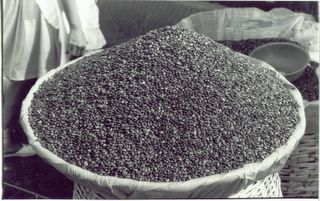What's Wrong With Us?
· Global ban also opposed by China, US and Russia
· Unexploded devices still killing three people a day
Richard Norton-Taylor and Ewen MacAskill
Thursday October 19, 2006
The Guardian
The location of an Israeli cluster bomb is marked with red paint near the village of El Maalliye in southern Lebanon. Photograph: Sergey Ponomarev/AP
Britain has joined the US, China and Russia to block a proposed ban on cluster bombs in the wake of extensive use of the weapons during the war in Lebanon.A group of countries, led by Sweden, is urging a worldwide ban on cluster bombs at arms talks in Geneva. Each bomb contains hundreds of small "bomblets", many of which fail to explode until picked up by inquisitive children or stepped on by civilians.
Israeli forces dropped an estimated 1m cluster bomblets in southern Lebanon this summer - 90% of which were dropped in the last three days of the conflict, a new report from Landmine Action said yesterday. The weapons have left a trail of unexploded munitions that is killing between three and four civilians each day and impeding relief work.
In just one month, the UN identified more than 500 areas hit by cluster bombs, the report said.
Most Israeli cluster strikes hit built-up areas. Landmine Action says when the research for its report was undertaken a month after the ceasefire, water and power supplies had been blocked, and schools, roads, houses, and gardens were still littered with unexploded devices.
The report says: "In many affected areas, farmers have not been able to safely harvest what was left of this summer's tobacco, wheat, and fruit; late-yielding crops such as olives will remain too dangerous to harvest by November and winter crops will be lost because farmers will be unable to plough their grains and vegetables."
Simon Conway, the director of Landmine Action, said: "Every day women and children are killed or injured as they sift through the rubble of their former homes by cluster munitions that failed to go off. If they were any other kind of product, they would have been recalled."
According to the UN's mine action coordinating centre, Israeli forces fired 1,800 rocket systems, each with 12 individual rockets, into south Lebanon.
Flawed weapons
· Cluster bombs are usually dropped from medium to high altitudes and consist of dozens of bomblets in an outer casing. They have anti-armour and anti-personnel capabilities
· They do not have precision guidance. With a 5% dud rate, unexploded bombs become landmines
· According to Human Rights Watch, Nato aircraft dropped nearly 2,000 during the campaign in the former Yugoslavia in 1999
· They also estimate that 1,600 Kuwaiti and Iraqi civilians were killed by the estimated 1.2m duds left after the 1991 Gulf war



0 Comments:
Post a Comment
<< Home